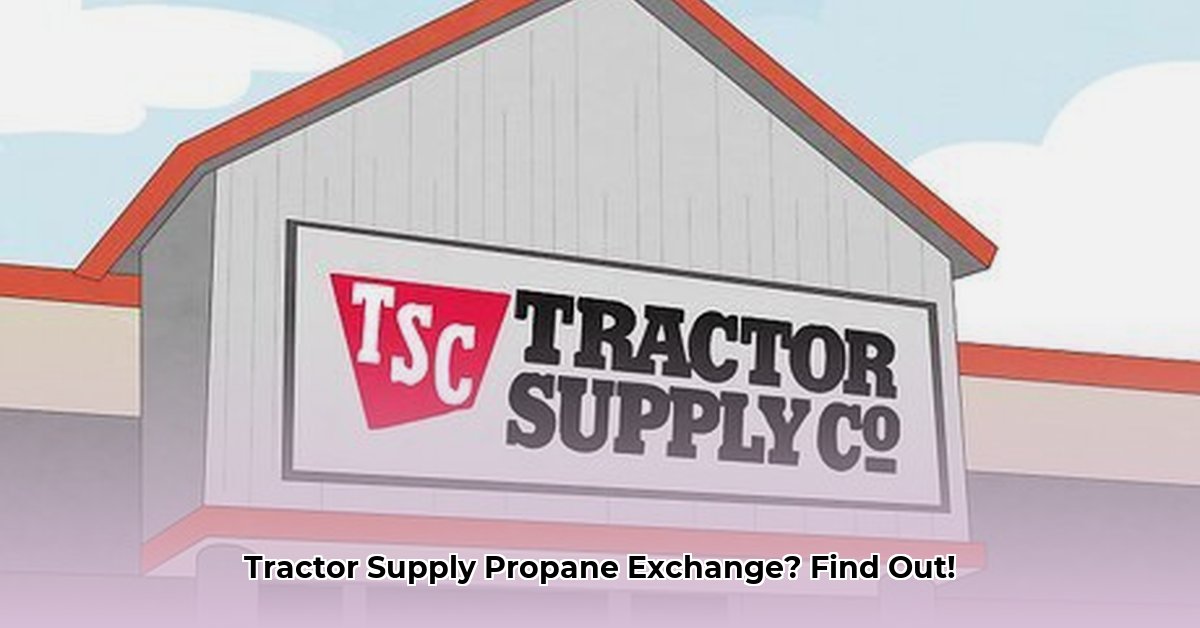
Does Tractor Supply Exchange Propane Tanks? A Convenience-Sustainability Balancing Act
Tractor Supply Company (TSC) offers propane tank exchanges, a service popular among farmers and rural residents. The convenience is undeniable: a quick swap of empty for full tanks saves time and effort. But this ease raises critical questions about the environmental impact of this seemingly simple transaction. This article examines the benefits and drawbacks of TSC's propane exchange, weighing convenience against sustainability concerns and exploring the need for greater transparency. For more information on propane tank hoses compatible with TSC tanks, check out this helpful resource.
The Convenience and Cost-Effectiveness of TSC's Propane Exchange
For farmers, the advantages of TSC's propane exchange are immediate and significant. Heavy propane tank transport—a risky and time-consuming task—is eliminated, reducing the potential for accidents and injuries. This time saved is particularly valuable during busy planting and harvesting seasons. Many farmers also report cost savings compared to bulk purchasing from other suppliers, making TSC's program economically appealing, especially for smaller operations. This convenience translates to both financial and operational efficiency. But is this convenience worth the potential environmental cost?
Sustainability Analysis: Unpacking the Environmental Footprint
While TSC's exchange system shifts the transportation burden, it doesn't eliminate the environmental impact. The company's delivery trucks still contribute greenhouse gas emissions, yet precise data on this aspect is remarkably scarce. This lack of transparency hinders a comprehensive environmental assessment.
Furthermore, the origin and production methods of TSC's propane remain largely undisclosed. Is the propane domestically sourced, imported, or produced using renewable methods? This uncertainty makes it difficult to calculate the overall carbon footprint of the exchange process. Without knowing the source, it's challenging to determine the true environmental cost of this seemingly convenient service. This lack of information fuels concerns from environmental groups and leaves farmers with incomplete information on the true sustainability of this option. Could more transparent sourcing information improve both public perception and the environmental performance of the TSC propane service?
Transportation Emissions: A Hidden Cost?
The environmental cost of transporting propane to TSC locations is a significant, under-researched aspect. While TSC's system reduces individual farmers' transportation burdens, the company's own delivery network inevitably contributes to greenhouse gas emissions. The absence of readily available data on fuel consumption and associated emissions is a significant barrier to a complete environmental assessment. This lack of transparency makes it difficult to accurately gauge the true environmental cost of the TSC propane exchange program.
Propane Sourcing: The Need for Transparency
The lack of transparency regarding propane sourcing raises further concerns. Without knowing whether the propane originates from domestic or imported sources, or whether renewable alternatives are employed, it's impossible to accurately evaluate the program's carbon footprint. This lack of information prevents a complete understanding of the environmental implications associated with TSC's propane exchange. The potential integration of renewable biogas offers a promising path toward a more sustainable future. Further research and reporting on propane sourcing are needed for a complete assessment.
Potential for Future Improvements: Embracing Renewable Biogas
The possibility of incorporating renewable biogas into the TSC refill system presents a significant opportunity for improvement. The transition to more sustainable energy sources is essential for minimizing the environmental impact associated with propane usage in the agricultural sector. This transition could lead to a significant reduction in greenhouse gas emissions and a more environmentally friendly energy solution for farmers.
Stakeholder Perspectives: Weighing Short-Term Gains Against Long-Term Impacts
TSC's propane exchange program impacts various stakeholders, each experiencing both short-term and long-term consequences.
| Stakeholder | Short-Term Impacts | Long-Term Impacts |
|---|---|---|
| Tractor Supply (TSC) | Increased propane sales, expanded market reach | Pressure to improve sustainability practices; potential for reduced profit margins if sustainable fuels are implemented. |
| Farmers | Reduced transportation costs and time; improved safety. | Access to potentially more sustainable fuel options; potential cost changes dependent on renewable fuel pricing. |
| Environmental Groups | Concerns about lack of transparency regarding emissions and sourcing. | Advocacy for cleaner fuel sources and collaborations with TSC on sustainable initiatives. |
| Government Regulators | Monitoring for compliance with environmental regulations. | Potential for stricter regulations regarding propane sourcing and transportation. |
Conclusion: Balancing Convenience with Environmental Responsibility
TSC's propane tank exchange offers undeniable convenience and potential cost savings for farmers. However, the lack of transparency regarding its environmental impact necessitates a more comprehensive assessment. TSC has a significant opportunity to increase transparency about its propane sourcing and delivery practices, including providing data on its carbon footprint and exploring renewable biogas integration. Consumers, meanwhile, can play a role by supporting companies committed to environmental sustainability. A truly sustainable future for agriculture requires both industry leadership and informed consumer choices.
Risk Assessment Matrix
This matrix summarizes the risks associated with TSC's program. Mitigation strategies are needed to address these concerns. Only a thorough and transparent accounting of emissions, sourcing practices and safety protocols can ensure long-term sustainability.
| Risk Factor | Likelihood | Impact | Mitigation Strategies |
|---|---|---|---|
| Propane Price Volatility | High | High | Hedging strategies; diversification of fuel sources. |
| Transportation Emissions | Medium | Medium | Optimized delivery routes; investment in fuel-efficient vehicles. |
| Lack of Sourcing Transparency | High | Medium | Public disclosure of sourcing information; engagement with environmental groups. |
| Safety Incidents | Low | High | Strict safety protocols; employee training; regular equipment maintenance. |